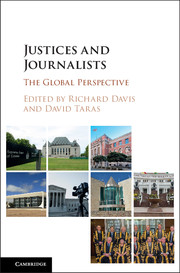Book contents
- Frontmatter
- Contents
- List of Contributors
- Acknowledgements
- Introduction: Judges and Journalists and the Spaces In Between
- 1 Judicial Communication: (Re)Constructing Legitimacy in Argentina
- 2 Communication beyond the Judgments: The Australian High Court, Speaking for Itself, but Not Tweeting
- 3 Uncommon Transparency: The Supreme Court, Media Relations, and Public Opinion in Brazil
- 4 The “Uncomfortable Embrace”: The Supreme Court and the Media in Canada
- 5 Germany: The Federal Constitutional Court and the Media
- 6 The Supreme Court and Media in Ghana's Fourth Republic: An Analysis of Rulings and Interactions between Two Estates of the Realm
- 7 The Puzzle of Judicial Communication in Indonesia: The Media, the Court, and the Chief Justice
- 8 Carping, Criticizing, and Circumventing: Judges, the Supreme Court, and the Media in Israel
- 9 Judicial Communication in South Korea: Moving toward a More Open System?
- 10 Changing the Channel: Broadcasting Deliberations in the Mexican Supreme Court
- 11 Norway: Managed Openness and Transparency
- 12 Judicial Institutional Change and Court Communication Innovations: The Case of the UK Supreme Court
- 13 Symbiosis: The US Supreme Court and the Journalists Who Cover It
- Conclusion
- Index
4 - The “Uncomfortable Embrace”: The Supreme Court and the Media in Canada
Published online by Cambridge University Press: 16 February 2017
- Frontmatter
- Contents
- List of Contributors
- Acknowledgements
- Introduction: Judges and Journalists and the Spaces In Between
- 1 Judicial Communication: (Re)Constructing Legitimacy in Argentina
- 2 Communication beyond the Judgments: The Australian High Court, Speaking for Itself, but Not Tweeting
- 3 Uncommon Transparency: The Supreme Court, Media Relations, and Public Opinion in Brazil
- 4 The “Uncomfortable Embrace”: The Supreme Court and the Media in Canada
- 5 Germany: The Federal Constitutional Court and the Media
- 6 The Supreme Court and Media in Ghana's Fourth Republic: An Analysis of Rulings and Interactions between Two Estates of the Realm
- 7 The Puzzle of Judicial Communication in Indonesia: The Media, the Court, and the Chief Justice
- 8 Carping, Criticizing, and Circumventing: Judges, the Supreme Court, and the Media in Israel
- 9 Judicial Communication in South Korea: Moving toward a More Open System?
- 10 Changing the Channel: Broadcasting Deliberations in the Mexican Supreme Court
- 11 Norway: Managed Openness and Transparency
- 12 Judicial Institutional Change and Court Communication Innovations: The Case of the UK Supreme Court
- 13 Symbiosis: The US Supreme Court and the Journalists Who Cover It
- Conclusion
- Index
Summary
The headlines were unprecedented. “Stephen Harper lashes out at top judge on Supreme Court”; “Chief Justice hits back at Prime Minister over claim of improper call”; “Duelling statements over Nadon appointment reveal PMO fight with top court.”
Riveting as they were, they did not begin to capture the depth of the drama playing out in the nation's capital in May 2014 – then- Prime Minister Stephen Harper issuing a statement suggesting Chief Justice Beverley McLachlin of the Supreme Court of Canada tried to engage him “on a matter that is or may be” before the court; the chief justice issuing her own counterstatement to categorically deny there was ever any such communication between her and the government. The spectacle played out for weeks, drawing in the opposition parties in Parliament, the Canadian legal community, and the news media. It spilled onto the global stage: the American College of Trial Lawyers supported McLachlin, as did the International Commission of Jurists, which investigated the available facts and concluded that Harper's criticism “was not well-founded and amounted to an encroachment upon the independence of the judiciary and integrity of the Chief Justice.”
While surprising in its tone, the Conservative prime minister's eruption did not come out of the blue. It was ostensibly tied to the failed appointment of Marc Nadon, Harper's choice to fill one of three seats on the Supreme Court reserved for Quebec. Nadon was a semiretired Federal Court of Appeal judge with a track record regarded as unremarkable by commentators, save for a dissent in which he alone sided with the government in Khadr v. Canada (Prime Minister), involving the repatriation of a Canadian citizen imprisoned at Guantanamo Bay. After the Nadon appointment was challenged, the Supreme Court was thrust into the political fray. In Reference Re Supreme Court Act, ss. 5 and 6 it was asked to clarify both the eligibility requirements for judges representing Quebec and the scope of Parliament's power to unilaterally change the court's composition. The majority's decision essentially disqualified Nadon. It was widely seen as a blow to the government of the day, which had moved to pass a law to try to ensure his eligibility.
- Type
- Chapter
- Information
- Justices and JournalistsThe Global Perspective, pp. 81 - 100Publisher: Cambridge University PressPrint publication year: 2017



